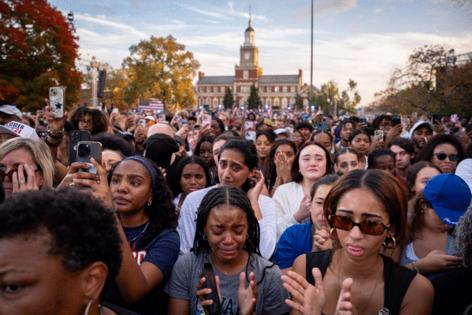Robin Epley: Feeling hopeless since the election? Experiencing grief over a political loss is valid
Published in Op Eds
If you — like me — were deeply disappointed in the direction this country and our state went on Election Day, then you — like me — have probably felt emotionally drained for the last week or so.
I fell into a fitful sleep in the wee hours of the morning after the election as it looked increasingly clear that former President Donald Trump would be reelected, complete with nightmares. Yet as I woke up to the certain news that Trump had indeed won, the sadness I was experiencing felt familiar, and not in a Feels-Like-2016-All-Over-Again kind of way.
Crying, depression, disbelief, numbness and even denial are all hallmarks of a valid, deeply human emotion that most people probably would not associate with politics: Profound grief.
“Grief is basically a sense of loss that a person has for something that is meaningful to them, and that sense of loss can have a whole bunch of emotions associated with that,” said Dr. Hendry Ton, the Associate Vice Chancellor for Health Equity, Diversity and Inclusion at UC Davis Health.
While grief is more commonly associated with the death of a loved one, Ton said, grief is also a common reaction to the loss of your hopes and expectations for the future. And when the grief is over something intangible or as ambiguous as an election, it can become even more complex.
“When you lose someone, you’re able to see their body. (It) can be incredibly painful, but it offers a sense of closure,” Ton said. “When you’re not able to pinpoint things, then you’re not able to deal with it and you’re not able to process it … The grief of post-election, I think a lot of people (are) grieving for the loss of what you had hoped the future would be, and your investment in that.”
Election grief is bipartisan, though often not at the same time; everyone can relate to experiencing a loss on Election Night and the sadness that comes after hopes for the future are quashed.
For those mourning the results of this particular election, the loss of the future they’d hoped for could have included affordable health care, real action on climate change, protection of rights for the LGBTQ+ community and immigrants, the return of our reproductive rights, or even the dream of America’s first female president.
You could also be in mourning for all the effort you put into securing that much-hoped-for future.
When I traveled to Reno a few weeks ago with more than 150 Democratic canvassers, many expressed their frustration of feeling like they hadn’t done enough to stop the first Trump Administration. If you participated in phone banking, wrote letters or walked precincts for weeks and months before the election — only to watch all your efforts crumble on Nov. 5 — it’s natural that you’d be pretty depressed about it.
“A lot of people, particularly in this election, they put a lot of energy into thinking about it (and) watching a lot about it,” Ton said. “So there was this sense of, not only a loss of the future, but also a questioning of like, ‘Did I get it wrong?’”
Grief often leads to a feeling of isolation which is usually remedied by seeking out community — typically our family and friends — for support. But with a country so divided, there’s a hesitancy present that is typically not a problem when simply dealing with death.
“With the polls being very different than the actual results, it leads people to question, ‘Who can I express my grief to?’” Ton said. “When you don’t know, or when there’s a lot of division within the community, your circles are smaller. And that complicates the grieving process as well, because you’re questioning your support system.”
The good news, I suppose, is that grief is a well-documented process with recognizable symptoms and recommended coping mechanisms — though it’s not quite as simple as just moving through the stages of grief like it’s a checklist. The most important thing in the early days of a loss is to have some self-compassion for yourself, Ton said.
“Grief is a process. And the first part of the process is denial, being stunned or being numb,” he said. “Some people may beat themselves up because they may be saying, ‘Why am I not doing anything about it right now?’ Well, that is part of the grieving process.”
Give yourself a break if you’re in shock, Ton added. “Remember this is a process, and in that process, there may be times where you’re ready to engage with others, and then there may be times where you need to just be less socially stimulated and have some peace.”
I definitely felt in shock after the results of Nov. 5, but as more time passes, I feel more able to confront the future; even one I very much hoped wouldn’t happen. Part of that has been giving myself a break and time to process the news. And like my grief for lost family members, I know it’ll get easier with time and practicing kindness toward myself and others going through the same grieving process.
©2024 The Sacramento Bee. Visit at sacbee.com. Distributed by Tribune Content Agency, LLC.




























































Comments